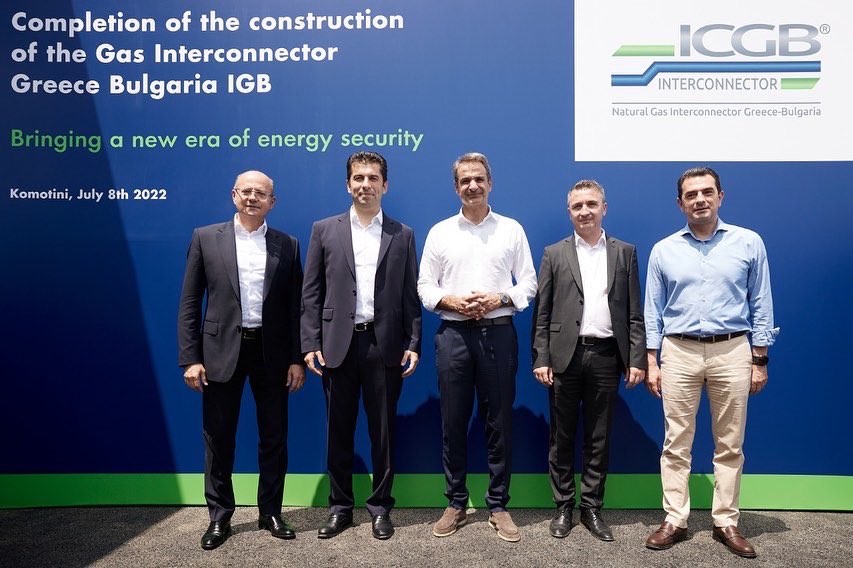Construction of the Interconnector Greece-Bulgaria (IGB) natural gas pipeline, which links the gas systems of the two countries, is completed and slated to start trial operation next month.
Despite the IGB pipeline hitting several administrative obstacles during its planning and construction, it is of great strategic significance for gas market operation in the region and the energy security of Bulgaria.
Especially after Sofia was cut off from Russian gas for refusing to accept Gazprom’s payment in roubles following Moscow’s invasion of Ukraine.
Prime Minister Kyriakos Mitsotakis, during the inauguration ceremony for the pipeline in the northern town of Komotini, described the IGB gas pipeline as “a decisive energy bridge, important for Greece, Bulgaria, the Balkans and Europe.”
“Today is an important moment for the entire Balkans and the whole of Europe.
“Because here we are not just inaugurating a natural gas pipeline, but a decisive energy bridge that unites the geographical south with the north, bringing Greece and Bulgaria, Athens and Sofia closer in the first phase.
“The importance of this pipeline for these two friendly countries is indicated by the presence of the Prime Minister of Bulgaria, Kiril Petkov.
“This pipeline, together with other regional energy infrastructure, which is already in an advanced planning stage, and the Greece-North Macedonia Interconnector and the one with Italy, will form a very effective and reliable network for the transportation of natural gas across the entire region, first in the Balkans and then in Europe itself, while at the same time help diversify gas supply routes.
“Hence, these projects come at a critical moment to strengthen the energy security and supply chain of the countries in the broader region.
“And, in a way, these critical projects (when fully operational) will help address the gas price rally which seriously threatens household and enterprise budgets.”
Pipeline of values
Mitsotakis referred to the IGB as a “pipeline of values” which will propagate the message of national security, Balkan solidarity and bilateral cooperation and prosperity.
“This message is of particular importance to our region, which deals with the exemption of a historically illiterate aggressiveness, which, alas, the global reality and our national readiness are ready to respond to.”
The 182 km IGB gas pipeline, which links the Greek town of Komotini with Stara Zagora in Bulgaria, although small in length by international standards, is considered of great strategic value since it will allow the free flow of gas from Greece to Bulgaria.
Some 32 km of the pipeline lie in Greek territory, while the rest are in Bulgaria.
Apart from the pipeline, the project comprises metering stations, a compressor, and an operations centre.
The IGB pipeline also has a reverse flow capability, which is vital when balancing market needs, leading to greater flexibility and, eventually, more competitive prices.
Growing demand
Furthermore, the pipeline is expected to help decongest the regional system, mainly on the Greek side, as Bulgaria has been importing growing gas volumes from Greece over the last few months.
The pipeline, which will run with an initial capacity of 3.0 billion cubic metres per year (bcma), is expected to upgrade to 5.0 bcma over the next three to four years as demand for gas is expected to grow.
The IGB as a European Project of Common Interest (PCI) was amply funded by European grants and soft loans from EIB and other sources.
It is estimated that the entire project cost some €240 mln.
According to Greece’s Energy Minister Costas Skrekas, gas utility DEPA and Bulgargaz will look jointly for regional gas delivery opportunities.
At the same time, they have already started joint liquefied natural gas (LNG) purchases through Greece’s LNG terminal at Revithousa.
Greece plans to double its storage capacity by the end of 2023 when a new floating LNG terminal is expected to come on stream off the harbour of Alexandroupolis.
The IGB Interconnector is expected to carry gas from the TAP pipeline to Bulgaria since TAP brings natural gas from Azerbaijan to Europe via Greece and Italy, but also from the present and future LNG terminals in Greece.
Bulgartransgaz, along with DEPA, has set up the ICGB consortium as the pipeline operator and has already signed a 1.0 bcma contract with Azerbaijan to supply gas through TAP.
This contract is expected to be fully activated by October 1, when the IGB is expected to enter full commercial operation.
Costis Stambolis is a Financial Mirror correspondent based in Athens










